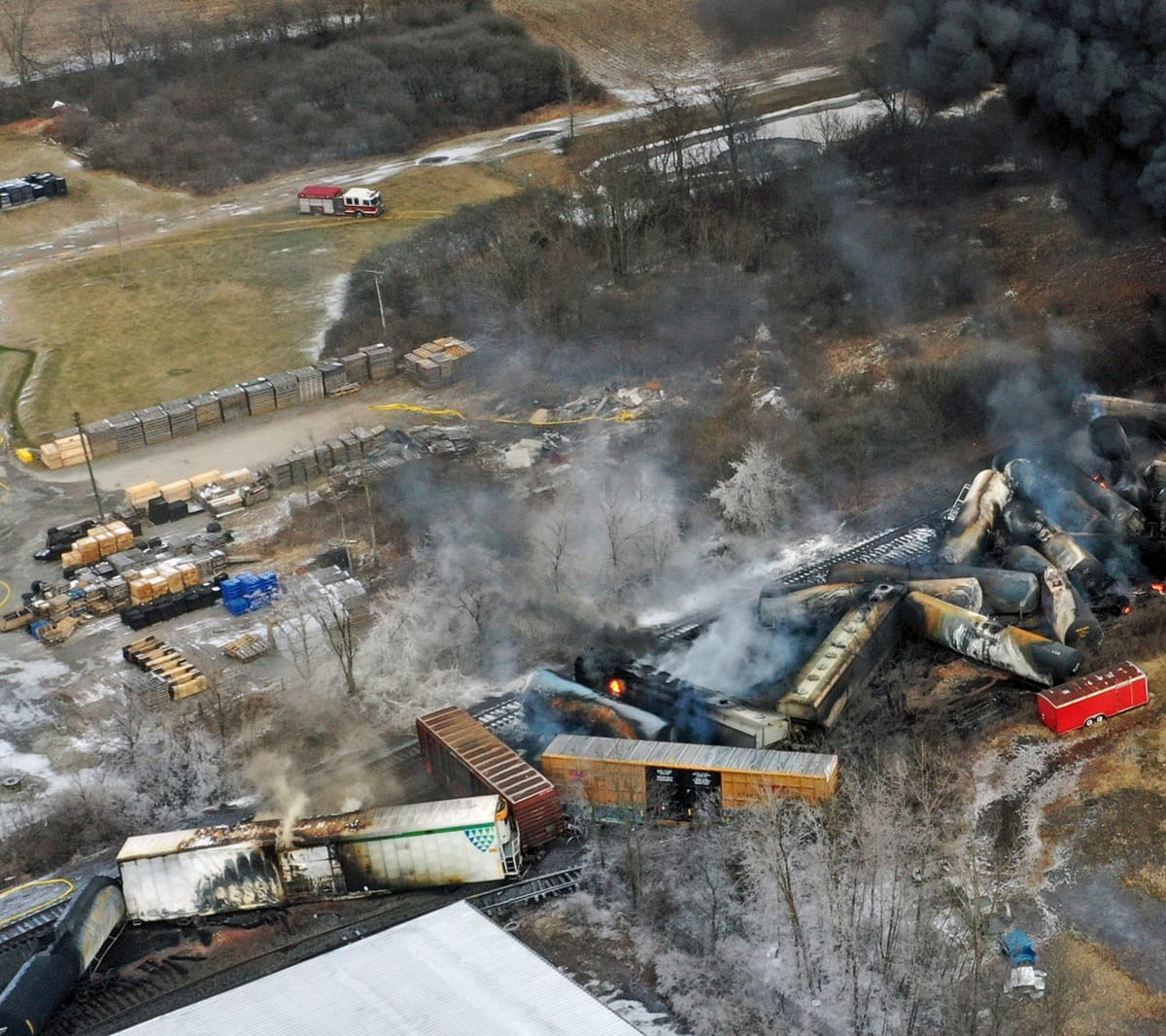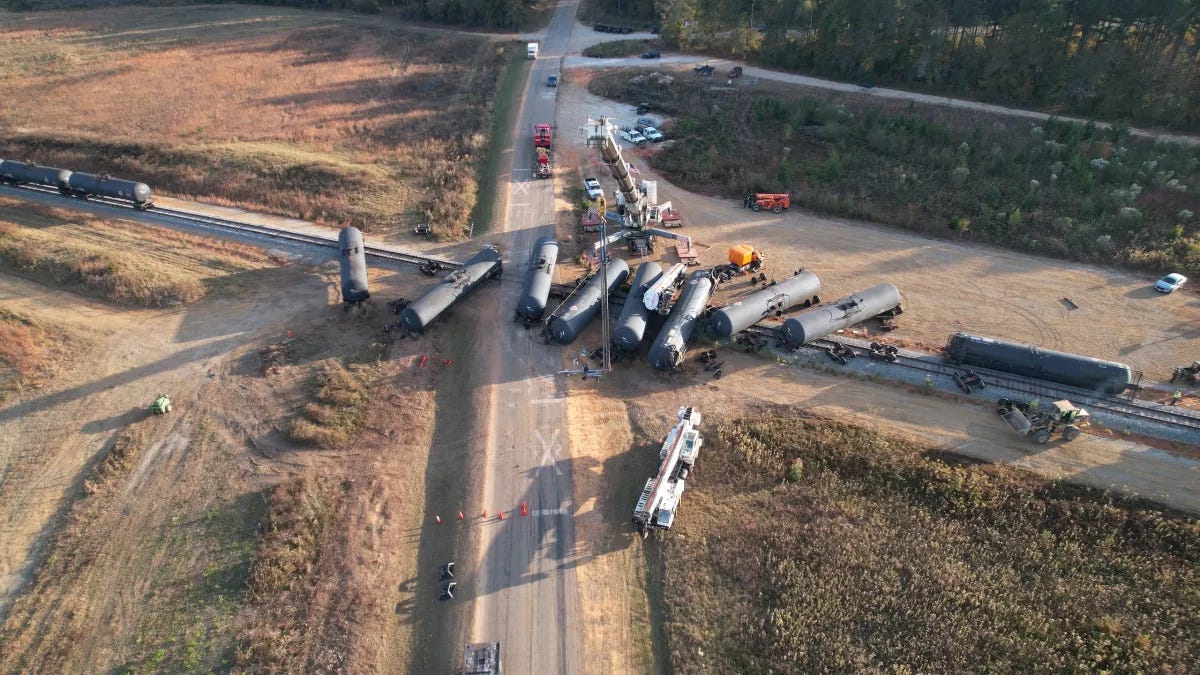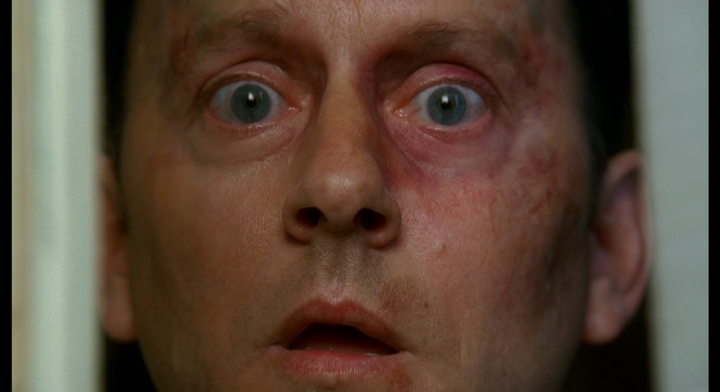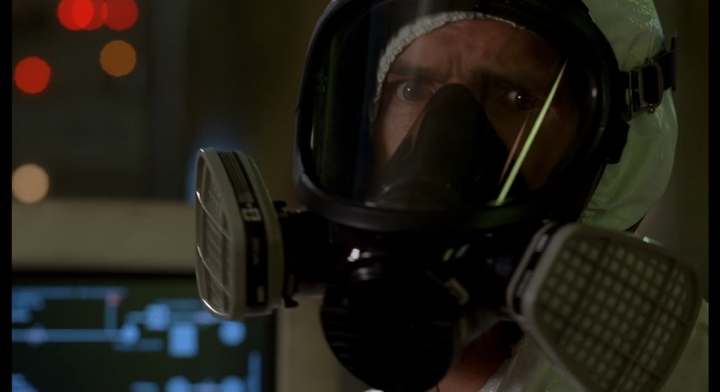Expensive Lies 01 - Airborne
We've got a real-life Toxic Airborne Event in Ohio. Why? Because not having one was going to be expensive. But who pays now?

Good morning. There’s an ongoing air quality disaster in East Palestine, Ohio.
A train owned by the Norfolk Southern corporation derailed there, and 10 of its 50 cars contained vinyl chloride, which is an industrial chemical compound and a carcinogen that causes liver cancer, among other things. Now residents have been evacuated, and pets are dead, and water production at the local plant has stopped, because the chemicals have seeped into the Ohio river. Local businesses are losing out on business they’d been counting on. Home values are probably not going to be great for quite some time, making moving away a prohibitively expensive proposition for most. There’s a controlled burn to get rid of the chemicals. Apparently being near the cloud is like breathing an acid mist, which seems like good times if you grew up on the planet Venus.
The train, like all trains on this rail system, was using a Civil War-era technology in its braking system—a fact that doesn’t seem possible, but maybe upon reflection isn’t necessarily a problem. After all, the wheel is technology that dates back further than that, and we still use wheels, right? However, one might argue that, just as we’re probably not still using stone wheels on our cars, there’s compelling reason to upgrade the brakes on our rail networks, which carry deadly chemicals and such.
And, in fact, it turns out that labor unions have been petitioning for upgrades for a long time (maybe since the Spanish American War, given the vintage of the technologies involved). What they’d like now is an improvement: electronically controlled pneumatic technology that has been around since the 90s. Labor has been making these demands on the grounds that … hmm, this is awkward, but I guess they believed the current braking system risks dangerous derailments. It turns out those out of touch coastal elites, the … who are these lotus-eating hippies again? hmm let’s see … ah yes! the workers of the rail freight industry operating in the rust belt—anyway, apparently those liberal snowflake union rail workers didn’t want to have to potentially breathe acid mist.
East Palestine is located on Ohio’s border with Pennsylvania, about 10 miles from West Virginia’s northward-reaching arm. The Guardian tells me this:
By one estimate, 25 million Americans live in an oil train blast zone, and if the derailment had the derailment occurred just a few miles east, it would be burning in downtown Pittsburgh.
So that’s geography for you.
Labor’s requested upgrades to the braking systems weren’t made, by the way. Freight corporations, including Norfolk Southern, successfully lobbied President Trump to ignore labor and dire warnings from the Federal Railroad Administration, and convinced them to repeal a 2015 rule requiring that the current brakes (which, again, were probably originally designed by a man with enormous sideburns named Jedediah) be replaced. This was an Obama-era rule, but in the end President Obama’s transportation department’s regulators also sided with industry over labor and didn’t enforce the rule.
Turns out that from the perspective of the rail corporations, who incidentally are raking in record profits, replacing the brakes was going to be expensive.
I get it. Who likes it when things are expensive? Thank goodness for corporate lobbyists, who are out there to save us needless expense! Thank goodness for President Trump and his party, who spent his entire presidency relaxing protectionary environmental and consumer safety regulatory restrictions!
Think how inexpensive things will be now!
Let me tell you two stories.

Story 1: Don DeLillo once wrote a book called White Noise, a satire about, among other things, consumer culture and corporatization in American life during the administration of Ronald Reagan, who was a president, and who—to give an identifying fact that's probably completely extraneous to what I'm talking about—kicked off conservatism's now 50-year-long project of strategic deliberate corporate deregulation and demolition of organized labor.
White Noise is set in a small college in the Midwest (the exact state is unnamed but given various cultural references you're clearly meant to think of eastern Ohio, or western Pennsylvania). The book is, in my opinion, good. You can see the recent surprisingly faithful film adaptation if you like, which is pretty good1 in my opinion. Anyway, in the film, this small college town is established to be in Ohio, outside of which there occurs an accident involving a train derailment and a deadly chemical spill, creating an Airborne Toxic Event, and the family is forced to flee for their lives, leaving readers in 2023 to wonder what dark magics of prognostication Don DeLillo was playing with in the early 80s.
There's a scene in the book (and the film) where our protagonist assures his family that everything is under control, and that nothing about the incident (which is upgraded even as he talks from a "feathery plume" to a "black billowing cloud" to an "airborne toxic event") is out of the ordinary, and everything that is happening can be handled by those in charge. He's still at it even as they get into the family station wagon to flee.
I thought about that scene a lot this week. The numbness, the paralysis. The assurance that nothing bad could possibly happen, even as bad things were happening.
I’m told that the controlled release and burn in East Palestine “went as planned,” by the way. Jim Justice, governor of the nearby state of West Virginia, told reporters “everything is fine here.” So that’s nice.
Story 2: Stephen King once wrote a novel called The Tommyknockers, and it is his very finest novel with the word “knockers” in the title. The plot of the book kicks off when the protagonist—who, because this is a Stephen King novel, is a bestselling author—stubs her toe against a protrusion in the woods and finds herself strangely compelled to dig it up. (It turns out to be an immense spaceship carrying a malign airborne psychic influence, and I’m sorry to spoil a 35-year-old novel, but hey, at least we have another airborne toxic event, which creates a neat parallel.)
I read The Tommyknockers in 1991, and remember the book being OK, or maybe even good, or maybe bad? I don’t remember. But I remember the metaphor.
Every once in a while, I feel like I’ve tripped over something big I have to dig up out of the ground. The most recent time was last year, when I realized I had something to say about sabotage, and about the process of repair, and the ways that our nation’s foundation in supremacy enacts sabotage in order to avoid paying the natural costs of repair and improvement by forcing others to pay the much higher unsustainable costs of brokenness. I thought I had a few things to say, but it turns out I had a lot to say. I kept digging and kept finding more. It was a big thing in the ground (BTOG).
I could be wrong, but this feels like another BOTG.
I could be wrong, but I think it’s going to be called Expensive Lies.
This BOTG is related to sabotage, in ways I think may already be apparent. It’s related to the idea of costs, and who is asked to pay costs, and the ways people and entities who can’t afford preventable higher costs find themselves paying them anyway, so that people and entities who can afford lower costs can avoid paying those costs.
This BOTG is unlike sabotage in thematic ways I hope to eventually make plain, but it’s also different in terms of conceptual maturity, by which I mean: I’d already spent a lot of time thinking about sabotage and repair, and organizing my thoughts, and so forth, before I hit send on any of it. I had already made several abortive efforts at the topic—several starts, several stops.
I mention this as a form of expectation management, since Sabotage was a very structured thing that came out at a regular clip for months. This … probably won’t be like that. This is me taking my first hacks at digging. You get to see my stabs at relevance and my false starts. There may be pauses between entries of weeks or even months as I nurse my toes and noodle over this protrusion over which I have so recently tripped.
Hopefully it’s still compelling work; certainly, the underlying question compels me.
Here’s the question: why do we believe so many expensive lies?
Let me tell you two more stories.2
Story 1: let’s pretend, for the sake of the story, that there's a virus.
Let’s pretend it’s deadly. Let’s say it’s a novel new strain of an old structure that we’ve known about for a long time. In this story, the virus appears quickly, and it spreads quickly, rapidly becoming a global pandemic. It harms a lot of people, and many of those it harms it kills.
Let’s say it’s airborne.
I hope this totally hypothetical scenario isn't too divorced from everyone's recent lived experience to be relatable.
Next, let’s pretend it's discovered that the best way of containing an airborne virus is for everybody to agree, for the sake of those who are most vulnerable, to do some things that are inconvenient. And, let's say that the best way of defeating such a virus was for governments to invest heavily on a vigorous, nationally coordinated testing and tracing regime led by expert epidemiologists—in short, on knowing as much as possible about the virus, and then on spending what it costs to combat it.
So, any society that was wise and knowledgeable about viruses would invest in vigilant systems to monitor and guard against outbreaks—in short, they would commit to knowing as much as possible about viruses in general, and then on spending what it costs to contain them—because viruses mutate, grow, change, and eventually evolve to new strains. That's just what viruses do.
Let's pretend that, in our story, some countries decide to do exactly this. But, in our story, there's a particular country that, though it has more resources than any other, is full of people—citizens and officials—who decide to ignore the virus. Let’s say it has even disbanded its program to monitor viruses. Let's pretend that in this society there exists a well-funded corporate media infrastructure fully committed to validating the choices of these deliberately ignorant people, and increasing their ignorance by broadcasting further disinformation, false equivalencies, and outright lies. Imagine such an apparatus, wearing the trappings of authority and trustworthiness, but aligned to delivering to their viewers reinforcements of their ignorance, fully dedicated to confessing that ignorance as wisdom, to urging their audiences toward increasingly extreme and aggressive acts in defense of that ignorance.
Now let’s pretend that one primary reason given for disbanding the virus monitoring program, and for not fighting the virus, was that doing so would be too expensive.
Can you imagine this? A society containing millions of people who absolutely refuse to participate in the minor discomforts needed to contain the virus, who oppose remedy, all on the basis of cost?
I’d say that the reasons that people have been given for not combatting the virus would have to be deemed a pack of lies.
Pretty expensive lies, I’d say.
End of story 1.
Story 2: Let’s pretend there’s a disease called cancer, and that there's a person who has it. Let’s say it’s been growing in this person's body for a very long time. Let’s say it’s crept, stealthy and invisible, for long months and years. Let’s say it’s only made certain localized parts of the body less comfortable as it grew, twinges and aches that in retrospect might have been considered warnings to heed. Now let’s say that for the first time there is an unignorable symptom. Let’s imagine a doctor who runs some tests. She prescribes immediate surgery to remove all affected tissue, an aggressive campaign of medication and treatment, frequent testing, and, after recovery, a radical change to diet, exercise, and environment.
Now: imagine our patient refuses the treatment, because in their estimation the treatment is too radical. You’d have to assume the patient had decided, for whatever reason, that the treatment was no longer worth the pain or the cost of change; that they'd decided instead to let matters progress on their established course, with all the likely consequences that choice entails.
Correct?
But now imagine this: imagine the patient lives in a society that has arranged things so that human health is not seen a public good, but as a necessary profit center. Imagine each cancer patient bears the full responsibility and burden of their treatment, and that the treatment has been privatized, which means that it’s subject to the profit motive, which means that it is going to be made as expensive as the market will bear. Now, imagine that, since the product in question is the ability to go on living, the cost the market will bear equates, for all but the most fortunate, to financial ruin.
Pretend with me that everyone in this society is told that the reason that cancer patients have to face such strange calculus is because making cancer treatment available to everyone would be too expensive—even though this society forces people to pay more for their treatment than any other similarly developed society. Pretend with me that everyone is told that the reason that medical care must be subject to the profit motive is that the profit motive always delivers the very best product and the most efficient results—even though this society demonstrates the worst medical results by far among similarly developed societies.
I’d say that the reasons that this society are given for the state of medical care would have to be deemed a pack of lies.
Some pretty expensive lies, I’d say.
End of story 2.
It seems to me that viruses and cancers have a number of clear similarities and intersections. Both are opportunistic, both committed only to the spread of themselves. Both are systemic, in that what they consume are healthy systems, first destabilizing them, and then, if left untreated, compromising them to the point of failure.
Both ought to be prevented and treated, generally speaking.
Not doing so would carry expenses far beyond any savings we might encounter by doing so.
Surely we all agree on that point, right?
Right?
The differences between viruses and cancers are also instructive.
A deadly virus has no place whatsoever in a healthy system. A virus spreads by mutating a new form for which a healthy system has not yet developed a defense. The treatment for such a virus is systemic eradication. The ongoing remedy against a virus is also eradication: to monitor for new strains to detect them, contain them as they're detected, and eliminate them once contained. A perfectly healthy system will have no deadly viruses.
A cancer typically grows when a system improperly prioritizes a part of itself that would otherwise be healthy and natural: bone, breast, lymph, lung, liver. Treatment for a cancer is meant, hopefully, to restore the tissue to a right balance within the system, removing the cells committed to an unhealthy growth while saving the cells that the system needs. After treatment for liver cancer, for example, a person in remission will still have some part of a liver, just one that hopefully remains free of cancer. And: though liver cancer springs from the liver, the existence of liver cancer doesn’t mean that livers in general are bad, and the suggestion that somebody working to eradicate liver cancer is in some way anti-liver would be seen as a foolish notion indeed. Also, a cancer frequently spreads because of environmental or lifestyle factors. The ongoing remedy for a cancer often involves testing and monitoring of the entire system, to ensure all of it is working in a way that is healthy and sustainable.
When we find our systems compromised by either cancer or virus, we should not avoid radical and transformative change, if we would align with health. We should seek radical remedy and transformational change. We should desire them as if they were survival itself—which they are.
And, if we would align against recurrence, we should never avoid a systemic change, no matter the expense. We should seek it. We should desire it as if it were survival itself—which it is. If we care about health, we must never refuse to know what we know. The cost of ignorance is, eventually, everything. The cost of knowledge, however painful, can never exceed it.
And it seems to me that the only way you arrive at any other conclusion is by getting a lot of people to believe some very expensive lies.
I’ve gone long enough.
I’d like to invite you to consider the virus to be the foundational element in our national spirit that powers sabotage—supremacy, in other words. The primary topic of Sabotage, in other words. White supremacy, sure, also wealth supremacy, and health supremacy, and male supremacy, and christian supremacy, and many others besides.
And I’d like to invite you to ponder what the cancer might represent in the story: a thing grown out of what should be a component of any healthy society, which now exists only for ceaseless growth—not for the benefit or sustainability of the system within which it resides, but only for the sake of growth itself.
Final thought: there are even more dangerous cargos than vinyl chloride that trains might be carrying during a derailment.
For example, there’s Liquified Natural Gas (LNG).
Here’s the Guardian again:
Just 22 train tank cars filled with LNG hold the same amount of energy as the Hiroshima bomb, a coalition of environmental groups wrote in comments to regulators opposing the LNG rail rule change in 2020. That is raising fears of a catastrophe if a proposed LNG port is built in New Jersey, which could take shipments from two 100-car trains daily that would run through nearby metro Philadelphia.
And, elsewhere in the same article:
Still, the US transportation department (DoT) in 2020 approved a rule to allow liquified natural gas, or LNG, to be shipped via rail with no additional safety regulations. Trains can now run 100 or more tank cars filled with 30,000 gallons of the substance, largely from shale fields to saltwater ports.
The decision was opposed by local leaders, unions, fire departments and the NTSB.
Incidentally, if any of you were worried that Joe Biden was coming for our deadly explosions and train derailments you needn’t worry. He recently signed a bill to block the U.S. rail workers strike in a time when rail workers have already faced massive layoff and long hours and desperate working conditions, and his Secretary of Transportation, Pete Buttigieg, at present has no plan to restore the 2015 safety requirements regarding brake upgrades.
In fact, transportation regulators are considering "a rail industry-backed proposal that could weaken existing brake safety rules.”
There have been eight train derailments over the last 5 years, by the way.
In the Pittsburgh area alone.
I guess we’re keeping our expenses down.
A.R. Moxon is the author of The Revisionaries, which is available in most of the usual places, and some of the unusual places, and co-writer of Sugar Maple, a musical fiction podcast from Osiris Media which goes in your ears. Yesterday he woke up sucking on a lemon.
For those who don’t know, on my arbitrary ratings system, “good” indicates 4 stars on a 5 star scale, and “pretty good” rates 3.5 stars. ↩
I’ve told a version these two stories before, which I mention just in case some sharp-eyed reader out there notices. Self-plagiarism is the best self-compliment, I guess. ↩




Comments ()